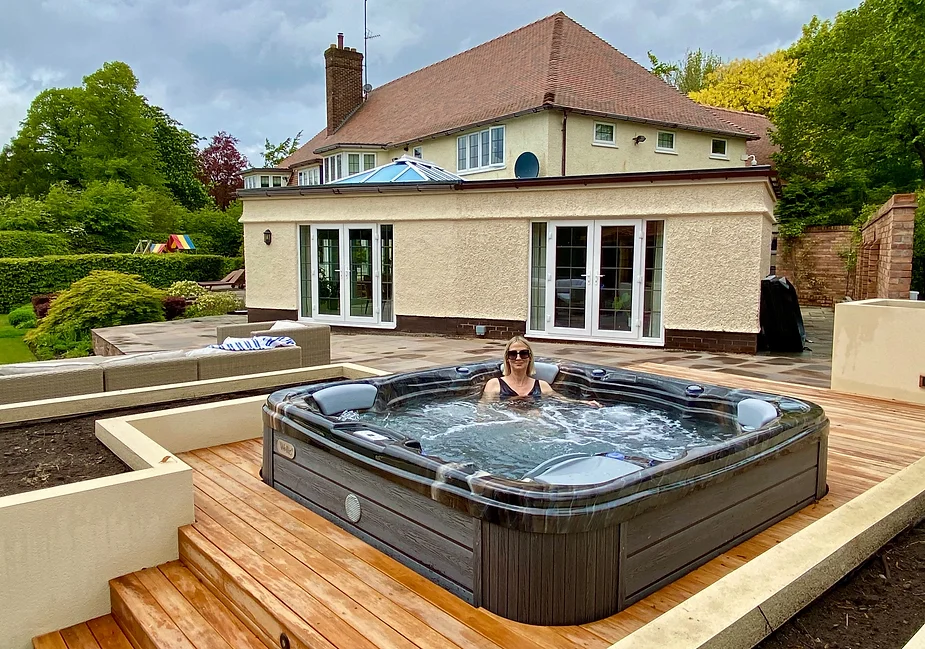A complete guide about the cause of stress and different activities that you can do…

Is a Hot Tub Tax Deductible?
You may be able to deduct a portion of your expense from your tax returns when purchasing a hot tub as a medical expense. Learn how!

Hot tubs are not only a luxurious addition to any home, but they are also known to have therapeutic benefits. From relieving stress and tension to soothing sore muscles, many homeowners find that a hot tub is an essential part of their self-care routine. However, the cost of a hot tub can be quite significant, leaving many wondering if they can deduct any of the expenses from their taxes.
The truth is, it is possible to claim a hot tub tax deduction if it is prescribed as a medical expense by a medical professional. In this article, we’ll explore the rules and regulations surrounding hot tub tax deductions and help you understand if you qualify. So, before you run out and make that big purchase, read on to find out if you can write off a portion of the cost on your next tax return.
Is a Hot Tub Tax Deductible: The Quick Answer
The short answer is that yes, a hot tub can be tax deductible if it is prescribed by a medical professional as a form of treatment for a specific medical condition.
According to Publication 502 from the IRS, medical expenses, including the costs of equipment and supplies, can be deducted when filing an income tax return if they are deemed necessary for the diagnosis, cure, mitigation, treatment, or prevention of disease.
It’s important to note that this deduction only applies to the portion of the hot tub expense that is considered a medical expense and not the entire cost. Before making any purchase or claiming any deductions, it’s always best to consult with a tax professional to understand the specific rules and regulations in your area.

How can you get a hot tub tax deduction?
Hot tubs can be tax deductible if they are prescribed by a doctor for medical treatment. To get a hot tub tax deduction, you must follow these steps:
- Obtain a doctor’s prescription in writing for the hot tub to be used in at-home hydrotherapy.
- Research IRS tax guidelines, specifically Publication 502 on medical and dental expenses.
- Consult with a tax accountant or preparer to ensure that deductions can be made.
- Track and organize expenses associated with purchasing, installing, and maintaining the hot tub.
- File your taxes using Schedule A of Form 1040, listing the qualified expenses as an itemized deduction.
It’s important to note that the hot tub must be primarily used for medical treatment, and the deductions will only apply to the person who received the prescription. Additionally, the tax laws for hot tub deductions may vary by state. It’s recommended to consult a tax advisor before making any purchases.
To successfully claim a hot tub tax write off, your total medical expenses, including the hot tub, must exceed 7.5% of your adjusted gross income (AGI). For example, if your AGI is $50,000, only medical expenses above $3,750 qualify for the deduction. Additionally, if the hot tub increases your home’s value, the deductible amount may be reduced by that value increase. For instance, a $6,000 hot tub that adds $2,000 to your property value leaves you with a $4,000 deductible expense. Getting a property appraisal can help clarify this impact and ensure you maximize your deduction.
| Aspect | Medical Deduction | Business Deduction |
|---|---|---|
| Eligibility | Prescribed by doctor for medical condition | Used in business (e.g., spa, rental property) |
| Deduction Type | Immediate, subject to 7.5% AGI threshold | Depreciation over time (e.g., 5 years) |
| Documentation | Prescription, receipts, medical reports | Business use proof, depreciation schedules |
| Primary Use | Primarily for medical care | Ordinary and necessary for business |
How to Get a Prescription for a Hot Tub
Getting a prescription for a hot tub is a critical step to qualify for a tax deduction or insurance coverage. A hot tub prescription must come from a licensed medical doctor (MD) and clearly state that the hot tub is necessary for treating a specific medical condition, such as arthritis, fibromyalgia, or chronic back pain. Here’s how to approach it:
- Consult Your Doctor: Schedule an appointment with your primary care physician or a specialist familiar with your condition. Explain how hydrotherapy could alleviate your symptoms, referencing studies or personal experiences if possible.
- Discuss Hydrotherapy Benefits: Highlight conditions like chronic pain or mobility issues that benefit from warm water therapy. Your doctor may need to justify the hot tub as a medical necessity.
- Request a Detailed Prescription: Ask for a written prescription that specifies the hot tub as a medical device for hydrotherapy. It should include your diagnosis, the treatment purpose, and a statement of medical necessity.
- Follow Up: Ensure the prescription is on official letterhead and signed by the doctor, as the IRS or insurance providers may require this for verification.
If your doctor is hesitant, consider consulting a rheumatologist or physical therapist who may be more familiar with hydrotherapy’s benefits. Keep this prescription handy when filing taxes or submitting insurance claims, as it’s the cornerstone of proving your hot tub’s medical purpose.
| Condition | How a Hot Tub Helps |
|---|---|
| Arthritis | Reduces joint pain and stiffness through hydrotherapy |
| Fibromyalgia | Eases muscle pain and improves sleep quality |
| Chronic Back Pain | Relieves tension and supports spinal alignment |
| Chronic Depression | Promotes relaxation and reduces stress |
| Type II Diabetes | Improves circulation and reduces neuropathy symptoms |
| Restless Leg Syndrome | Soothes muscle discomfort and promotes relaxation |
Sample Letter of Medical Necessity for a Hot Tub
A letter of medical necessity can strengthen your case when seeking a hot tub tax write-off or insurance coverage from providers like UnitedHealthcare or Medicare. This letter, typically written by your doctor, should detail why a hot tub is essential for your health. Below is a sample template you can share with your physician:
Sample Letter [Doctor’s Name and Credentials] [Medical Practice Name and Address] [Date] To Whom It May Concern, I am writing to confirm that [Patient’s Full Name], under my care, requires a hot tub for medical treatment. [Patient’s Name] has been diagnosed with [specific medical condition, e.g., rheumatoid arthritis], which causes [symptoms, e.g., chronic joint pain and stiffness]. Hydrotherapy in a hot tub is medically necessary to alleviate these symptoms, improve mobility, and enhance quality of life. The hot tub will be used primarily for therapeutic purposes, including [specific benefits, e.g., reducing inflammation, improving circulation, or relieving muscle tension]. This treatment is essential for [Patient’s Name]’s ongoing care and is not intended for general recreational use. Please contact my office at [Doctor’s Contact Information] if you require additional documentation or clarification. Sincerely, [Doctor’s Signature] [Doctor’s Name and Title]
This letter should be tailored to your specific condition and submitted with your tax documents or insurance claims. Always verify with your provider or tax professional that the letter meets their requirements.
Will Insurance Pay for a Hot Tub?
Many users wonder if insurance providers like Medicare, UnitedHealthcare, or Medicaid will cover the cost of a hot tub. The answer depends on your plan and whether the hot tub is deemed medically necessary. Here’s a breakdown:
- Medicare: Medicare Part B may cover a hot tub as durable medical equipment (DME) if prescribed by a doctor for a specific medical condition, such as severe arthritis or mobility issues. However, coverage is not guaranteed, and you’ll typically need to pay 20% of the approved cost. Check with your Medicare plan to confirm eligibility and any exclusions.
- UnitedHealthcare: UnitedHealthcare may cover a hot tub if it’s prescribed as DME and designed specifically for medical use. Standard multi-person hot tubs are less likely to qualify, as coverage focuses on the policyholder’s medical needs. Contact UnitedHealthcare to verify if your plan includes hot tubs and what documentation is required.
- Medicaid: In some states, Medicaid covers hot tubs as DME when prescribed for medical treatment. Coverage varies by state, and some have strict DME policies. Reach out to your state’s Medicaid office to understand restrictions and application processes.
To improve your chances of coverage, submit a detailed prescription and a letter of medical necessity. Be prepared for potential appeals if coverage is denied, and consult your provider for specific claim procedures. For more on hydrotherapy’s benefits, explore our guide on what is hydrotherapy.
Free Hot Tub for Disabled Veterans
If you’re a disabled veteran looking into options for a free hot tub, there are programs designed to support you. Organizations like Wish for Our Heroes run the Hot Tubs for Heroes initiative, which provides free hot tubs to qualifying veterans in select areas such as Denver or Carson City. These programs aim to offer therapeutic relief through hydrotherapy for conditions like chronic pain or mobility issues.
Additionally, the VA’s Home Improvements and Structural Alterations (HISA) grant offers up to $6,800 for home modifications to improve accessibility and health. While hot tubs, spas, and Jacuzzis are generally excluded, they may be considered if a doctor prescribes them specifically for hydrotherapy. It’s worth checking with your local VA office or prosthetics department to see if your condition qualifies—some veterans have successfully obtained approval for hot tubs to manage pain from service-related disabilities.
Private companies, like Sundance Spas partners or local dealers, also occasionally donate hot tubs to veterans through contests or nominations. If you or a loved one is a disabled veteran, explore these resources for potential assistance. Always consult with a VA representative or the organization directly to apply and confirm eligibility.
Does a Hot Tub Qualify for Its General Health Benefits?
Sure, lounging in a hot tub may be the ultimate form of relaxation, but unfortunately, that alone won’t cut it when it comes to tax deductions. To claim a hot tub as a medical expense, you’ll need a prescription or written treatment recommendation from a medical professional stating that it’s necessary for the treatment of a specific condition. Conditions such as arthritis, chronic back pain, fibromyalgia, chronic depression, and restless leg syndrome may qualify. But here’s the catch: the hot tub must primarily be used for the cure, mitigation, treatment, or prevention of disease, not just for leisure and enjoyment. And if you’re thinking of sharing the hot tub with friends and family, be aware that if it’s used for recreational purposes as well, you may not be able to deduct the entire cost. So, before you go making any big hot tub purchases, make sure you have a prescription and consult with a tax professional. Otherwise, it’s a relaxing soak right up to the point when the IRS agents roll up in your driveway.
Want to know more about hot tubs? Check out our hot tub facts article for more interesting snippets.
Hot Tub Depreciation Life According to the IRS
If you’re using a hot tub in a business context, such as a rental property or wellness center, the IRS classifies it as a capital asset with a specific depreciation life. According to IRS guidelines, hot tubs typically have a depreciation life of 5 years for business equipment or 27.5 years for improvements to residential rental property. Here’s what you need to know:
- Business Equipment (5 Years): If the hot tub is used in a commercial setting, like a spa, you can depreciate its cost over 5 years using the Modified Accelerated Cost Recovery System (MACRS). This allows you to deduct a portion of the cost annually on Form 4562.
- Rental Property (27.5 Years): For hot tubs installed at rental properties, such as an Airbnb, the IRS considers them a capital improvement, requiring depreciation over 27.5 years. This longer period reflects the hot tub’s role in enhancing property value.
- Documentation: Maintain records of the hot tub’s purchase, installation, and business use to justify depreciation claims. Personal use can reduce the deductible amount, so track usage carefully.
Depreciation can be complex, so work with a tax professional to determine the correct schedule and ensure compliance with IRS rules. For more on rental property hot tubs, check out our guide on installing a hot tub on your rental property.
Can You Write Off a Hot Tub as a Business Expense?
Curious if you can write off a hot tub as a business expense? If your hot tub is used in a business setting—like a spa, wellness center, or rental property—it may qualify for tax benefits, but not as an immediate deduction. The IRS typically treats a hot tub as a capital asset, meaning you’ll need to depreciate its cost over time, often over 5 years for business equipment or 27.5 years for rental property improvements. For example, adding a hot tub to an Airbnb property is considered a capital improvement, and you’d recover the cost through depreciation, reported on Form 4562. The hot tub must be “ordinary and necessary” for your business, so mixing in personal use could complicate your claim. Keep meticulous records of business use and work with a tax professional to set up proper depreciation schedules and avoid IRS headaches.
Can property improvement expenses be deducted as capital expenses?
Capital improvement expenses can also be written off as a medical expense, as long as they’re used for the medical care of yourself, your spouse, or any dependents living in your home. Think of it as a two-for-one deal: not only are you improving your property, but you’re also getting a tax break. Just keep in mind that if the improvement increases the value of your home, it will also decrease the amount you can deduct as a medical expense. On the bright side, if the improvement doesn’t add any value to your property, you can deduct the full cost. So, whether you’re installing a hot tub or swim spa, make sure to get that property appraised to see how it affects your deductions.
FAQ
Can a hot tub be a medical expense?
Want to turn your backyard oasis into a tax break? Just ask your doctor to write you a prescription! With a little help from the IRS, your hot tub could qualify as a medical expense. Just don’t forget to check out Publication 502 for all the details.
Can a hot tub be considered a medical device?
You bet your bubbles it can! With a prescription from your doctor and a little IRS magic, your hot tub can become a medical device. Just remember, it needs to be primarily for the treatment of a physical or mental illness or defect. So, don’t try to deduct that hot tub you put in for your weekend parties.
Is a hot tub durable medical equipment?
It sure is! If your Medicare Part B plan covers durable medical equipment, your hot tub may qualify. Just be prepared to prove its medical necessity and to cover 20% of the cost. But hey, that’s still 20% less than paying for it all yourself!
Can a doctor write a prescription for a hot tub?
You bet they can! A doctor’s prescription is the first step in turning your hot tub into a tax-deductible medical expense. So, if you’re looking to turn your backyard oasis into a tax break, ask your doctor to write you a prescription!
Will Medicare pay for a hot tub?
Medicare doesn’t cover hot tubs for everyone. If you can establish that a hot tub is medically necessary and your policy doesn’t expressly exclude payment for one, you may be able to receive financial assistance with purchasing one through your plan. Always check with your Medicare plan to confirm coverage details.
Will United Healthcare pay for a hot tub?
United Healthcare may pay for a hot tub if it is prescribed as a necessary piece of durable medical equipment by a doctor and if it is specifically constructed for medical use. Traditional multi-person hot tubs are unlikely to be covered as they are not specifically constructed for medical use and the insurer is only interested in covering the policyholder. If you are in doubt about whether your insurer will cover a certain hot tub or not, make sure to ask them.
Does Medicaid cover hot tubs?
In most states, Medicaid will cover hot tubs if they are prescribed as a necessary piece of durable medical equipment by a doctor. However, some states have restrictions on qualifying durable medical equipment (DME), though restrictive policies can — in some cases — be litigated. Contact your state’s Medicaid office for specifics.
How to get a prescription for a hot tub?
To get a prescription for a hot tub, you must first request a doctor’s prescription for the hot tub as a “medical device.” The conditions that may qualify for a hot tub prescription include: arthritis, fibromyalgia, chronic back pain, chronic depression, type II diabetes, and certain injuries. Essentially, any condition that can benefit from hydrotherapy is likely eligible. You must have a prescription from a medical doctor (a prescription from a chiropractor, nurse practitioner, or non-MD homeopath typically will not qualify).
Can you write off a swim spa?
You may be able to claim a swim spa as a tax deduction if it is primarily for the cure, mitigation, treatment, or prevention of disease. The IRS allows tax deductions on medical expenses related to “the diagnosis, cure, mitigation, treatment, or prevention of disease” but not until the expenses exceed 7.5% of your adjusted gross income. You can also claim a deduction for the swim spa as a capital expense even if it is an improvement to your home.
Are home improvements tax deductible for 2022?
Home renovations made for medical purposes may be tax deductible in 2022, but only if they exceed 7.5% of your adjusted gross income. The IRS allows tax deductions on medical expenses related to “the diagnosis, cure, mitigation, treatment, or prevention of disease.” Renovations such as construction of ramps, widening doorways or hallways for wheelchair access, and installing modifications to bathrooms or stairways, including lifts and handrails, may qualify for a full medical deduction as long as their addition does not increase the value of the property. If it does, a partial deduction is allowed. You can find a full list of home improvements that qualify for the medical deduction on the IRS website.
Is a hot tub a capital improvement?
A hot tub can be considered a capital improvement when it is added to a rental property. The cost of the hot tub cannot be deducted all at once, and it must be capitalized and depreciated over a period of time. The IRS looks at rental property deductions in two ways: repairs, which are one-time fixes that keep the property in its current condition and don’t add much, if any value, and improvements, which are any update or upgrade that adds value to the property and are considered a capital expense.
Read our article to learn more about how long a hot tub lasts and plan your depreciation schedule.
Can I write off a hot tub for Airbnb?
No, you cannot write off the cost of a hot tub for an Airbnb rental property as a deduction. The cost of improvements to a rental property, such as a hot tub, is recovered through depreciation and reported on Form 4562. Only a percentage of these expenses are deductible in the year they are incurred.
Can I deduct hot tub maintenance costs?
Yes, you may be able to deduct hot tub maintenance costs if the hot tub is prescribed for medical treatment. Routine maintenance, like chemicals or repairs to keep it functional for hydrotherapy, can qualify as a medical expense under IRS Publication 502, as long as the hot tub’s primary use remains medical. Keep detailed receipts and consult a tax professional to ensure these costs are properly documented on Schedule A of Form 1040.
What is the 7.5% AGI threshold for medical deductions?
The 7.5% AGI threshold means your total medical expenses, including a hot tub, must exceed 7.5% of your adjusted gross income to qualify for a tax deduction. For example, if your AGI is $60,000, only expenses above $4,500 are deductible. This rule, outlined in IRS Publication 502, ensures only significant medical costs get tax relief. Use Schedule A of Form 1040 to itemize these deductions and consult a tax advisor for accuracy.
Summary: Is a hot tub tax deductible?
In conclusion, owning a hot tub can come with some pretty sweet tax deductions if you’re using it for medical reasons. Whether it’s for physical therapy or just simply to ease the aches and pains of everyday life, the IRS may let you write off some of the costs. But, as with all things tax-related, it can be a bit of a murky topic. So, if you’re considering purchasing a hot tub for medical reasons, or if you’re not sure which hot tub brands and models qualify, it’s best to contact a tax professional or the experts at Epic Hot Tubs for help. They can show you how to choose a hot tub. And remember, even if it doesn’t qualify for a tax write-off, it’s still a great way to unwind and relax after a long day at work… or a long day of doing your taxes.

Richard Horvath
Richard has been in the hot tub & spa industry for years. As a long hot tub & swim spa owner himself, Richard has a passion for helping homeowners create their dream backyard.



